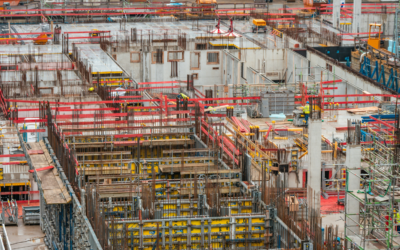In the rapidly evolving world of real estate, understanding the nuances of construction work is pivotal. It’s not just about erecting structures; it’s about shaping communities and economies.
Construction work encompasses a broad range of activities, from residential buildings to large-scale infrastructure projects. For property developers, grasping the intricacies of this field can unlock unparalleled opportunities.
Defining Construction Work
Construction work involves being involved in the process of building or assembling infrastructure. This includes everything from simple residential homes to complex commercial buildings and even large-scale infrastructure projects like bridges and highways.
The construction industry is a multifaceted sector that requires a blend of technical expertise, strategic planning, and skilled labor.
The Broad Scope of the Construction Industry
The construction industry is vast and diverse, covering various sectors such as residential, commercial, industrial, and infrastructure development.
It involves numerous stakeholders, including contractors, subcontractors, architects, engineers, and laborers. Each player brings specialized skills and expertise to the table, making construction work a collaborative effort.
An Overview of the Importance of Construction Work
Construction work is fundamental to societal development. It lays the foundation for economic growth by creating jobs, improving infrastructure, and enhancing the quality of life.
Without our construction workers, our cities and communities would not have the buildings, roads, bridges, and utilities that support daily life and commerce.

The Significance of Construction Work
The significance of construction work extends beyond the mere act of building; it serves as a backbone for society.
Construction activity is essential for facilitating growth and modernization, driving economic progress through the development of residential, commercial, and public spaces. Each project completed not only contributes to the physical landscape but also plays a crucial role in fostering innovation and sustainability.
By investing in construction work, property developers not only enhance their portfolios but also contribute to the overall well-being of communities, ensuring that future generations can thrive in well-planned environments.
Understanding this significance is vital for developers seeking to make informed decisions that align with societal needs and aspirations.
Economic Impact and Contribution to the Job Market
Construction work is a significant driver of economic activity. According to the U.S. Census Bureau, the construction industry contributes over $1.3 trillion annually to the national economy.
It also plays a crucial role in employment, providing jobs for millions of workers across the country in various trades. The impact on the job market is substantial, with construction activities supporting both direct and indirect employment.
Role in Infrastructure Development and Community Growth
Beyond economic contributions, construction work is vital for infrastructure development. It enables the creation and maintenance of essential public works such as roads, schools, hospitals, and utilities.
These projects are the backbone of community growth, enhancing connectivity, accessibility, and quality of life. For property developers, investing in construction projects can significantly influence regional development and prosperity.

Key Players in Construction Work
In the complex world of construction, numerous key players contribute to the successful execution of projects.
Among them, contractors and subcontractors are essential, as they manage the day-to-day operations on-site and ensure that the work adheres to plans and specifications. Architects and engineers play crucial roles in the design and planning phases, translating visions into workable blueprints while addressing safety and compliance standards.
Additionally, suppliers and manufacturers provide the necessary materials and equipment, while skilled laborers execute the tasks required to bring a project to fruition.
The collaboration among these various stakeholders is critical to navigating the challenges of construction and delivering the desired outcomes in a timely and efficient manner.
Contractors: Managing and Executing Projects
Contractors are the linchpins of construction projects. They oversee the entire construction process, from planning and budgeting to execution and completion.
Their responsibilities include coordinating with various stakeholders, managing resources, and ensuring that projects are completed on time and within budget. Successful contractors possess strong leadership skills and a deep understanding of construction techniques and regulations.
Subcontractors: Specializing in Specific Tasks
Subcontractors are hired by contractors to assist and perform specific tasks within a construction project. These tasks can range from electrical work and plumbing to painting and landscaping.
Subcontractors bring specialized expertise to the project, ensuring that each aspect is executed with precision and quality. Their collaboration with contractors is crucial for the seamless progression of construction activities.
Specialty Trade Contractors: Providing Niche Services
Specialty trade contractors focus on niche areas of construction, such as HVAC systems, roofing, and masonry. They possess advanced skills and knowledge in their respective fields, enabling them to deliver high-quality workmanship.
Their role is indispensable, for example, as they provide the technical services necessary for the successful completion of complex construction projects.
Interdependence of These Players in Project Completion
The success of a construction project hinges on the interdependence of contractors, subcontractors, and specialty trade contractors.
Effective communication and collaboration among these players ensure that projects are executed efficiently and meet the desired standards. Each player’s expertise contributes to the overall quality and timeliness of completing the project.

Influential Factors in Construction Work
Understanding the influential factors in construction work is essential for property and real estate developers to navigate this complex industry effectively.
These factors can significantly impact project timelines, costs, and overall success. Key considerations include economic conditions, regulatory requirements, advancements in technology, and environmental sustainability.
Each of these elements plays a critical role in determining how construction projects are planned and executed, highlighting the importance of staying informed and adaptable in an ever-changing landscape.
Economic, Environmental, and Regulatory Considerations
Several factors influence construction work, including economic conditions, environmental concerns, and regulatory requirements. Economic factors such as interest rates, wages, inflation, and funding availability impact project feasibility and profitability.
Environmental considerations, including sustainability and resource management, are increasingly important in modern construction practices. Regulatory compliance ensures that construction activities adhere to safety and quality standards.
Impact of Technological Advancements and Changing Practices
Technological advancements are revolutionizing the construction industry. Innovations such as Building Information Modeling (BIM), drones, and 3D printing enhance project planning, monitoring, and execution.
These technologies improve accuracy, reduce costs, and increase efficiency. Staying abreast of technological trends is essential for property developers to maintain a competitive edge.

The Future of Construction Work
The future of construction work is poised for transformation as it embraces innovation and adapts to evolving societal needs. With an increasing focus on sustainability, smart building practices, and the integration of advanced technologies, the industry is shifting towards more efficient and environmentally friendly methods.
As urbanization continues to rise, construction professionals are called to meet the challenges of creating resilient infrastructure while contributing to a circular economy.
This next phase job growth will not only redefine how buildings and infrastructure are designed and constructed but also reshape the overall impact of the construction sector on communities and the environment.
Projected Growth and Emerging Trends in the Industry
The construction industry is poised for significant growth in demand in the coming years. According to industry forecasts, global construction output is expected to reach $15.5 trillion by 2030.
Emerging trends such as modular construction, green building, and smart infrastructure are shaping the future of the industry. These trends emphasize sustainability, innovation, and efficiency, aligning with the evolving demands of modern society.
The Role of Construction Work in Sustainable Development and Smart Cities
Sustainable development is at the forefront of the construction industry’s future. Practices such as using eco-friendly materials, reducing waste, and implementing energy-efficient designs are becoming standard.
The development of smart cities, which integrate technology and data to optimize urban living, is another key trend.
Construction work plays a pivotal role in creating infrastructure that supports sustainability and smart city initiatives.

Skills and Resources in Construction
In the dynamic field of construction, a diverse array of skills and resources is essential to ensure successful project execution. From technical expertise in building practices to strong managerial abilities for coordinating teams, the skill sets required of construction contractors vary widely among the various players in the industry.
Moreover, access to quality resources—including materials, advanced tools, and technology—can significantly influence both the efficiency of the construction process and the overall quality of the final output. As the industry evolves and faces new challenges, ongoing training and resource management become vital for maintaining high standards in construction work.
Necessary Skills for Construction Work
Working in construction requires a diverse skill set. Key skills include technical knowledge, problem-solving abilities, and physical stamina.
Technical skills involve understanding construction methods, materials, and equipment. Problem-solving skills are crucial for addressing challenges that arise during projects. Additionally, communication and teamwork skills are essential for collaborating with employers and various stakeholders.
Overview of Materials, Tools, and Technologies Used
Construction projects rely on a wide range of materials, tools, and technologies. Common materials include concrete, steel, wood, and glass. These materials are selected based on the project’s requirements and specifications.
Tools such as hammers, drills, and saws are used for manual tasks, while machines like excavators and cranes handle heavy-duty work. Advanced technologies like laser scanners and robotic total stations enhance precision and efficiency.

Best Practices and Safety in Construction Work
In the construction industry, adhering to best practices and prioritizing safety are paramount for ensuring successful project outcomes.
Implementing effective safety protocols not only protects workers from potential hazards but also contributes to overall operational efficiency. By fostering a culture of safety, construction firms can minimize accidents, enhance productivity, and reduce costs associated with injuries and delays.
This section will explore key strategies for promoting safety and best practices that can be integrated into everyday operations within the construction environment.
Regulatory Standards and Best Practices for Safety
Safety is paramount in construction work. Adhering to regulatory standards and best practices ensures the well-being of workers and the quality of the project.
Key worker safety measures include wearing personal protective equipment (PPE), conducting regular safety training, and implementing site-specific safety plans. Compliance with Occupational Safety and Health Administration (OSHA) regulations is essential for maintaining a safe work environment.
Strategies for Efficient Project Management and Completion
Efficient project management is critical for the success of construction projects. Strategies include thorough planning, effective resource allocation, and continuous monitoring.
Utilizing project management software can streamline processes, track progress, and facilitate communication. Regular site inspections and quality control measures ensure that projects meet deadlines and standards.

About South Coast Improvement Company
South Coast Improvement Company is a leading construction firm dedicated to delivering high-quality services across a diverse range of projects. Established with a commitment to excellence, our company specializes in commercial construction, renovation, and project management.
With a team of skilled professionals, we embrace innovative solutions and sustainable practices to meet the unique needs of our clients. Our focus on safety, efficiency, and customer satisfaction has positioned us as a trusted partner in the construction industry.
As we continue to grow, we remain committed to enhancing our expertise and resources, ensuring that every project reflects our dedication to quality and integrity.

Conclusion
Understanding construction work is essential for property and real estate developers. The construction industry plays a vital role in economic growth, infrastructure development, and community enhancement.
By recognizing the significance of construction and staying informed about industry trends, developers can make strategic business decisions that drive success.
For those interested in further exploring the world of construction, consider engaging with industry experts, attending relevant workshops, and leveraging available resources.
With the right knowledge and approach, you can contribute to the creation and renovation of remarkable structures and thriving communities.
Explore more resources and connect with professionals to enhance your understanding and involvement in the construction industry. Your next great project and career awaits!
View Our Work
Aspen Dental
Partnering with The Aspen Group on the construction of a new Aspen Dental facility that’s functional & welcoming for patients & staff alike. South Coast Improvement Company was awarded the construction of a new Aspen Dental facility in Killingly, CT. The...
Springhouse Senior Living – HumanGood
Designed to enhance comfort & functionality. South Coast Improvement company was hired by HumanGood for an interior and exterior renovation at Springhouse Senior Living. Our skilled teamtransformed the 2nd through 5th floor common areas into brighter, more...






